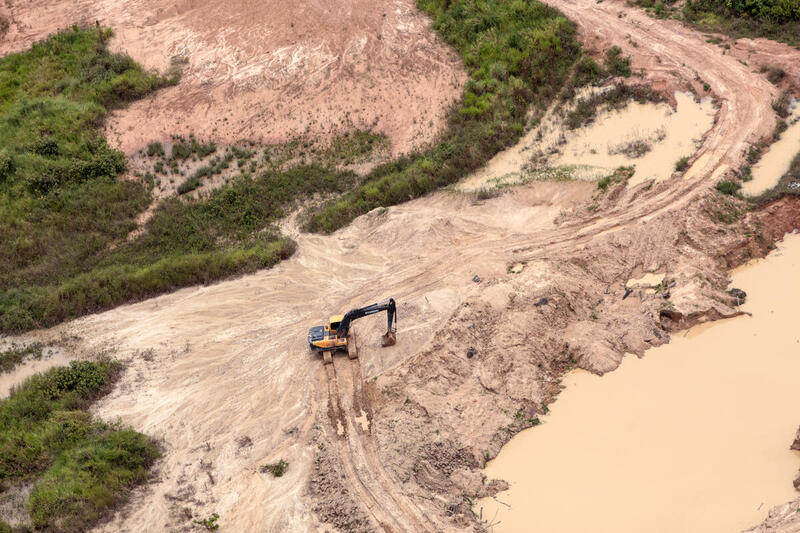AMAZON, GOOGLE AND EMBRAER are among the multinational companies that may be using gold sourced from a Brazilian group under investigation for buying and exporting gold from illegal mining operations in the Amazon. The Federal Police also suspect that, since 2021, part of this gold has been illegally extracted from Indigenous territories and conservation units.
Customs data accessed by Repórter Brasil shows that, in the last four years, the Indian refiner Sovereign Metals made several purchases of gold from Fenix Metais do Brasil, based in Cuiabá (MT). Fenix Metais do Brasil and Fenix Distribuidora de Títulos e Valores Mobiliários, companies from the same business group, are implicated in gold exploitation and “laundering” schemes, according to investigations by the Federal Police obtained.
In 2023, a court order blocked 10 shipments of gold purchased from Fenix Metais by Sovereign Metals (more details below).
In “gold laundering” schemes, mining titles from regulated areas are falsely indicated in invoices as the source of the marketed gold, aiming to give the appearance of legality to gold extracted from illegal mining operations.
Besides Amazon, Google (through its parent company, Alphabet Inc.), and Brazilian company Embraer, the Indian refiner is listed as a potential supplier of gold to companies such as Philips, Sony, Canon (manufacturer of photographic equipment), Dolby (audio technology lab), 3M (manufacturer of health, safety, and office supplies), and even Starbucks, which sells coffee machines containing gold filaments.
The information about the commercial relationship is disclosed by the companies in their 2023 Conflict Minerals Reports. Companies listed on U.S. stock exchanges that acquire tin, tungsten, tantalum, and gold are required to disclose their suppliers of these minerals, which may be purchased indirectly through external suppliers.
Repórter Brasil reached out to all the mentioned multinationals.
Amazon responded that it is committed to “offering products and services produced or supplied in a way that respects human rights and the environment” and to “avoiding the use of minerals that fuel conflicts.” Philips stated it does not buy directly from Sovereign. “It appears in our 2023 Conflict Minerals Report because it is listed as a supplier to one of our suppliers, but we have no confirmation that it is linked to any of our products,” said the statement.
Embraer denied having commercial relationships with Sovereign Metals and stated that gold is not a relevant item in its suppliers’ production chains. “We have initiated a more in-depth diligence process to understand if there is any connection between our suppliers and gold extraction in Brazil, including questioning potential actions to mitigate risks.”
Starbucks said it is committed to ethical sourcing in its supply chain and has no active contracts with Sovereign or Fenix.
3M responded that the Indian refiner is not its supplier.
Sony, Canon, Dolby, and Google did not respond to the inquiries sent by Repórter Brasil by the time of the publication.
The Fenix Group responded that its activities “are guided by legality, transparency, and compliance” with international standards. “Regarding the investigations mentioned in the article, which are under confidentiality, the companies are available to the competent authorities to provide any information.”
Sovereign Metals did not respond to the Repórter Brasil‘s contact attempts. In a document detailing its precious metal acquisition policy, the refiner states that the products it buys come from “legal and ethical sources” and that it “refuses to purchase metals from illegal mining or suppliers that do not comply with local and international regulations.”
Read the companies’ full responses here.
Lack of monitoring
“Companies will say they are not consuming from this actor [Sovereign Metals], which is clearly involved with gold from illegal mining, simply because they are not researching or investing in tracing their supply chains,” says Christian Poirier, director of the organization Amazon Watch. “It is a huge concern that companies consuming large amounts of gold do not know where this mineral comes from,” he adds.
According to Amazon Watch, companies buying gold should identify and disclose the origin of all Brazilian gold used in their supply chains, ideally tracing it back to the source mine. The organization also stresses the need to publicly disconnect problematic refiners or suppliers.
The business between Fenix and Sovereign
Customs records accessed by Repórter Brasil show that between November 2021 and September 2024, Sovereign made 256 purchases from Fenix Metais and two acquisitions from Grama Metais do Brasil, a company from the same group, registered at the same address as Fenix in Cuiabá (MT). In addition to gold bars, the Indian refiner also purchased silver from both companies. These transactions totaled 565.6 million USD.
The Federal Police believes that the illegally acquired gold from Fenix DTVM is being sold abroad by Fenix Metais.
In September 2023, as part of Operation Ouropel, a court order blocked ten shipments of gold purchased from Fenix Metais by Sovereign, destined for New Delhi Airport in India. A total of 137.3 kg of metal, worth R$ 38.8 million (6.4 million USD), was seized. Authorities suspect that part of this mineral may have been illegally extracted from mining operations in the Amazon.
What investigations say about Fenix Group
According to Federal Police investigations, one of the gold laundering schemes involving Fenix group companies used mineral titles registered in the name of José Barbosa de Lima in Itaituba, southwestern Pará, since April 2021.
Although one of these mining titles was declared as a major source of gold movement, satellite images indicated no mining activity in the area. According to the Federal Police, between 2021 and 2022, areas linked to Lima laundered 988.2 kg of gold, with sales totaling R$ 257.4 million (42.9 million USD). Fenix DTVM was the main buyer, responsible for R$ 126.5 million (21 million USD) of this total.
José Barbosa de Lima did not respond the inquiries from Repórter Brasil.
Another scheme identified by the Federal Police used a mining title resulting from a partnership between the Southwest Pará Miners’ Cooperative (Coopersupa) and the owner of a property in Itaituba. The landowner received 10% of the production value.
The landowner claimed to have been surprised by invoices issued between 2022 and 2023 for gold extracted from the site and sold by the cooperative to Fenix DTVM, despite no mining activities occurring there. According to the landowner, upon reporting this to the company, Fenix claimed its compliance department had found no irregularities regarding the mining title.
The Federal Police found that 130.7 kg of gold, worth R$ 32.7 million (5.4 million USD), were laundered from this mining title, with Fenix DTVM as the sole buyer. Investigators suspect that the actual source of the mineral is protected areas, “given the proximity of this city [Itaituba] to conservation units and Indigenous lands.”

Indigenous lands such as Kayapó, Munduruku, and Yanomami are the most affected by illegal mining in the country, according to data from the Mapbiomas platform.
Coopersupa did not respond by the time of publication.
Suspension of activities and arrest of partner
As part of the investigation into the two schemes, in September 2023, the Federal Police carried out a search and seizure operation at Fenix DTVM, which included the blocking of assets and the detention at Guarulhos Airport of ten shipments that were to be exported by Fenix Metais to Sovereign. Other companies and individuals were also targeted in the operation. In November of the same year, the Pará Court ordered the suspension of Fenix DTVM’s activities in the state.
In September 2024, Pedro Eugênio Gomes Procópio da Silva, one of the partners in Fenix DTVM and Fenix Metais, was one of the 13 arrested in another Federal Police operation.
This time, investigators found that Mineradora Dente Di Leone, based in Redenção, southern Pará, was buying gold illegally extracted from the Kayapó Indigenous Land and other irregular mines in Pará, Amazonas, Mato Grosso, and Roraima. According to the Federal Police, the company sold 3.1 tons of illegal gold between 2021 and 2023 to only two companies, including Fenix DTVM.Pedro da Silva was released in late October. Repórter Brasil tried to contact the businessman through his personal phone and his lawyers but received no response by the time of publication.

